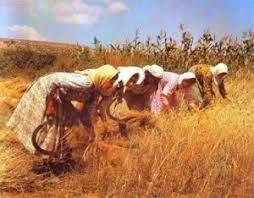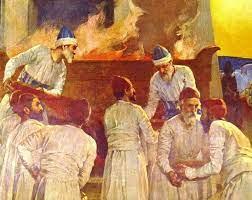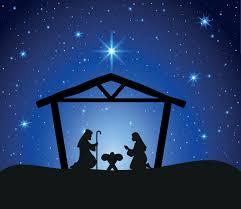Cw – The Duties of the Priests and the Levites 18: 1-7
The Duties of the Priests and the Levites
18: 1-7
The duties of the priests and the Levites DIG: Without the priests, the people couldn’t approach God. Why not? What are the commonalities and differences between the priest/Levite distinction and the elder/deacon distinction in the B’rit Chadashah? How were the priests and Levites cared for? Why was it important that the LORD confirm Aaron and the Levites in their calling?
REFLECT: How easy is it for you to think of God as someone dangerous to approach the wrong way? Explain. What do you think is the believer’s responsibility in the area of giving? Explain. How can and should we care for our Messianic synagogue and church leaders? ADONAI provided for the needs of His servants through His people. Are the needs of your spiritual needs cared for?
Basically, the Levites worked under the supervision of the priesthood.
Numbers 18 begins with the words: ADONAI said to Aaron (18:1). The phrase occurs again twice in 18:8 and 18:20. In every other case in the Torah except in (Leviticus 10:8), God never spoke to Aaron directly, but always through Moses. In this case, YHVH gives Aaron the benefit of personal communication as a further sign of His special relationship to God. This, and the other events of preceding chapters, confirms Aaron’s status as high priest, a status that was under question ever since Miryam and Aaron’s rebellion (to see link click Bu – The Rebellion of Miryam and Aaron) and the challenges of the people in Chapter 16.347
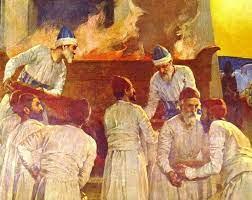
Duties of the priests (18:1-2): The children of Isra’el had cried out in dismay, “Must everyone who comes near, who comes near to the Tabernacle of ADONAI die?” It is, in essence, the same question we asked at the outset of Leviticus. It was a fearful thing for an unauthorized person to approach Ha’Shem. To act foolishly or carelessly when approaching Him was to invite disaster. How, then, did one draw near to God? The answer to their question came immediately as YHVH spoke directly to Aaron, reaffirming the role and function of the priests and Levites. It is interesting that the Lord spoke directly to Aaron, not to Moshe. It must be that He meant to further confirm His choice of Aaron as high priest.348 He tells him, “You, your sons and your father’s household shall bear the guilt in connection with the Sanctuary, and you and your sons with you shall bear the guilt in connection with your priesthood.” Therefore, if, through their negligence, an unauthorized person approached the Sanctuary to perform holy functions (see Cn – Korah’s Rebellion), the priests would bear the sin committed by that person. You will take charge of all the holy furnishings and the bronze altar, so that there will no longer be anger against the people of Isra’el (18:5). Neither the Israelites nor the Levites could draw near to God, only the priests; and only the high priest could enter the Most Holy Place once a year on Yom Kippur (see Leviticus Co – Yom Kippur: The Removal of All Sin).
Numbers 18 clearly defines the line between priest and Levite (see Ezra-Nehemiah An – Priests, Levites and Temple Servants Who Returned with Zerubbabel). The Levites helped the priests perform their ministry to YHVH. But you are to bring your kinsmen, the tribe of Levi, along with yourselves, to work together with you and help you — you and your sons with you — when you are there before the Tabernacle.
Everything rises or falls with leadership, and Aaron was the leader of the priestly family. He was accountable to God for what happened at the Tabernacle. God doesn’t dwell in Temples made with human hands (Acts 7:48), but our bodies are a temple for the Ruach Ha’Kodesh who lives inside of us, whom we received from God (First Corinthians 6:19).
We must be careful how we treat our bodies and what we do to the Church of Yeshua Messiah. If anyone destroys God’s temple, God will destroy that person; for God’s temple is sacred, and you together are that temple (First Corinthians 3:17).349
Duties of the Levites (18:3): They were to be at ADONAI’s disposal to perform all kinds of tasks related to the Tabernacle; only they are not to come near the holy furnishings or the bronze altar, so they would not die (18:3). They could only minister in the courtyard of the Tabernacle (see the commentary on Exodus Ex – The Courtyard and Gate of the Tabernacle), not in the Sanctuary. Even the Levitical Kohathites (see At – The Clan of Kohath), who transported the holy furnishings of the Tabernacle when on the move, could not touch them until they had been properly covered. Violation of that mitzvah was punishable by death, as was the consequence for anyone who was not divinely ordained to serve in the priesthood.350
Basically, then, the Levites worked under the supervision of the priesthood (Aaron’s sons Eleazar and Ithamar), and that the work of the priests and Levites was different. The priests functioned primarily inside the Sanctuary with the holy furnishings and the bronze altar; while the Levites assisted the priests, guarded/protected the outside of the Tabernacle from any encroachment by any Israelite in the camp, carried the holy furnishings on the march, taught the people the Torah, were gatekeepers, singers when the Temple was built, and served as judges in cities of refuge. God knew that the priests would need reliable helpers who could assist them in their duties.
Working together (18:4-7): They will work together with you in your duties related to the Tabernacle, whatever the service in the Tabernacle may be; but an unauthorized person is not to come near you. On their shoulders rested the protection of the nation before God. The weight of that responsibility must have been enormous.351 You will take charge of all the holy furnishings and the bronze altar, so that there will no longer be anger against the people of Isra’el (18:4-5). Because unauthorized people in the Tabernacle courtyard or Sanctuary would bring on the wrath of YHVH.
I myself have taken your kinsmen the Levites from among the people of Isra’el; they have been given as a gift to ADONAI for you, so that you can perform the service in the Tabernacle (18:6). The priesthood was God’s gift to Isra’el, for without priests the people couldn’t approach YHVH. The Levites were God’s gift to the priests, relieving them of menial tasks so they would devote themselves fully to serving the LORD and the people. The seven men appointed in Acts 6, usually called deacon, had a similar relationship to the apostles. There’s nothing demeaning about serving tables, but the apostles had more important work to do.352 You and your sons with you will exercise your prerogatives and duties as priests in regard to everything having to do with the bronze altar and within the outer veil (see the commentary on Exodus Fj – The Outer Veil of the Sanctuary). I entrust the service required of the priesthood to you. It was a privileged position, so any unauthorized person who tried to perform as a Levite was to be put to death (18:7).
It’s easy to see how Messiah performs this aspect of the priesthood in the eternal sense (see the commentary on Hebrews Ay – Messiah’s Qualifications as our Great High Priest). The Aaronic priesthood was only able to bear the guilt of the people as long as the Tabernacle stood, because it was limited to the present world. But the earthly Tabernacle was merely a reflection of the heavenly Tabernacle where Messiah has carried out the same priestly function on our behalf (see Hebrews Bz – The Better Tabernacle Purified with Better Blood). His priesthood is a better priesthood than Aaron’s priesthood (see Hebrews Aw – Messiah is a Better Priest Than Aaron).353
Dear Heavenly Father, Praise You for Your great love that willingly suffered shame and great pain to offer the gift of salvation to those who love You as their Lord and Savior (Romans 10:9-10). Have this attitude in yourselves, which also was in Messiah Yeshua, Who, though existing in the form of God, did not consider being equal to God a thing to be grasped. But He emptied Himself – taking on the form of a slave, becoming the likeness of men and being found in appearance as a man. He humbled Himself – becoming obedient to the point of death, even death on a cross. For this reason God highly exalted Him and gave Him the name that is above every name, that at the name of Yeshua every knee should bow, in heaven and on the earth and under the earth, and every tongue profess that Yeshua the Messiah is Lord – to the glory of God the Father (Philippians 2:6-11).
It is so gracious of You to forgive those who love You! You add a huge blessing by the gift of Messiah’s righteousness! He made the One who knew no sin to become a sin offering on our behalf, so that in Him we might become the righteousness of God (Second Corinthians 5:21). Since You say You will reward those who serve You with loving attitudes, Your promises are always true. I praise and bless You for being so very loving and wonderful! For no one can lay any other foundation than what is already laid – which is Yeshua the Messiah. Now if anyone builds on the foundation with gold, silver, precious stones, wood, hay, straw, each one’s work will become clear. For the Day will show it, because it is to be revealed by fire; and the fire itself will test each one’s work – what sort it is. If anyone’s work built on the foundation survives, he will receive a reward (First Corinthians 3:11-14). I rejoice in serving You, not for the heavenly reward, but to say thank You with my life. In Messiah Yeshua’s holy Name and power of His resurrection. Amen






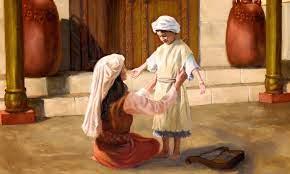

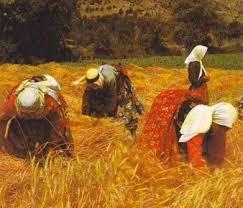

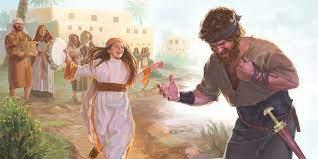


 If God’s children refuse to obey ADONAI’s mitzvot faithfully, He will discipline them (see the commentary on
If God’s children refuse to obey ADONAI’s mitzvot faithfully, He will discipline them (see the commentary on 




